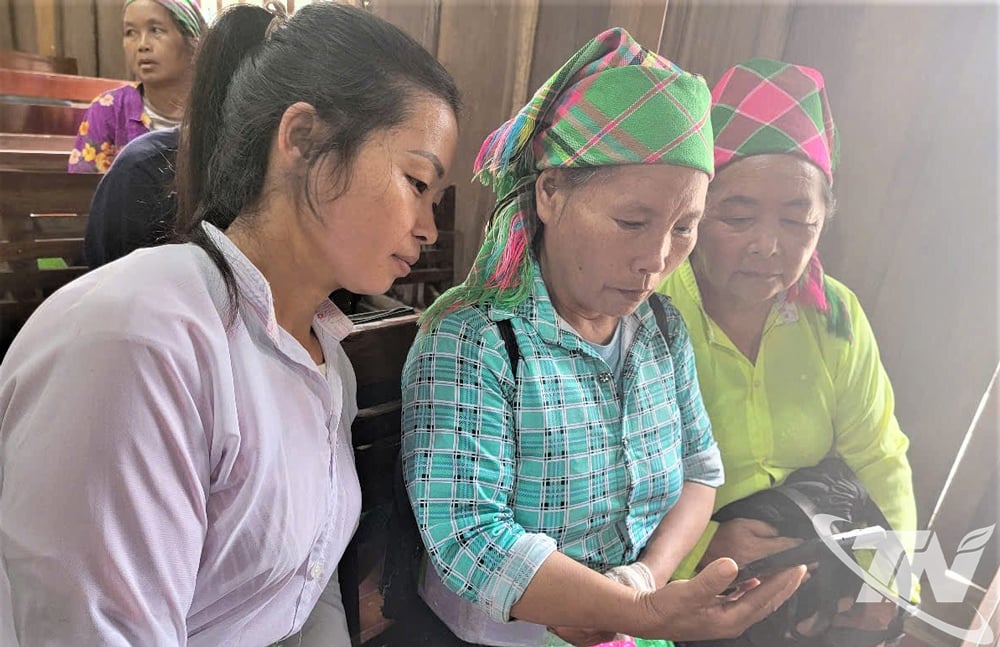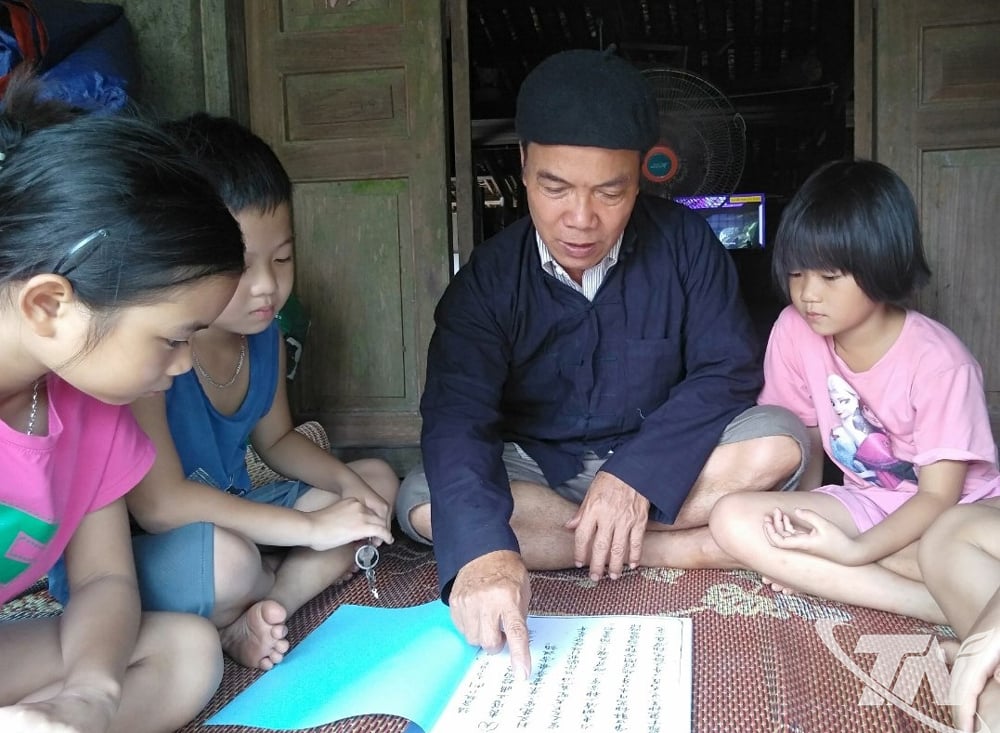 |
| At school, children of ethnic minority groups study in the common language (Vietnamese) - Photo taken at Thai Nguyen Ethnic Boarding School. |
Lack of an environment for using one's mother tongue.
I often go to the highland markets of Lam Vi, Than Sa, and Nghinh Tuong communes, sitting in the market stalls drinking corn wine with the "forest boys," listening to their lively conversations about gathering bamboo shoots and catching stream fish. The most interesting thing is hearing bits and pieces of their conversations because the "forest boys" speak to each other in their own ethnic language.
But that was many years ago. In the era of a digitized market economy, people in the mountain valleys can now buy goods with a click of a mouse, and shippers deliver them right to their doorsteps. Yet, the traditional market hasn't disappeared. It still holds its meetings, and the "mountain boys" I met years ago are now grandparents. The new generation of "mountain boys" is more dynamic; they speak to each other in standard Vietnamese.
Sharing with us, Mr. Nong Dinh Long, a Tay ethnic minority from Khau Dieu hamlet, Binh Yen commune, said: "More than 50 years ago, we children didn't dare speak our ethnic language at school for fear of being ridiculed by our classmates. However, at home, our elders still spoke to each other in the Tay language, so we were able to learn from them."
Looking at the mountains devoid of large trees, the fields now cultivated by the local people using machinery instead of manual labor, and the wide, paved roads embracing the mountain slopes, healthy, young people are being transported to industrial zones. They are a new generation, knowing how to seize opportunities to rise out of poverty.
Mr. Duong Van Phong, a Mong ethnic minority from Dong Tam hamlet, Phu Luong commune, said: "Most people of working age go out to work. To facilitate communication, everyone needs to know how to speak the common language. While working far away, people can only speak their own ethnic language when calling home to relatives."
In an environment where people of different ethnic groups live and work together, it's natural for everyone to find common ground and compromise. Speaking one's own ethnic language can feel out of place. Artisan Trieu Van Tuan, a Dao ethnic minority from Quan Chu commune, shared: "The Party and State have many preferential policies for ethnic minorities, including preserving their languages, but languages are still increasingly fading away. Currently, very few young people in the San Diu community know how to speak their own ethnic language."
 |
| In society, children of ethnic minorities communicate in the common language; only when they call home to relatives do they have the opportunity to speak their mother tongue. |
I have met many artisans from ethnic minority groups. They are proud to be fluent in their native languages, but deep down they always carry a sadness because their children and grandchildren refuse to learn their mother tongue. This is because the children are in school. To excel in their studies, they need to be proficient in the common language and learn at least one foreign language.
The mother tongue among ethnic minority communities is fading over time. This is inevitable, as their children attend school and learn in the common language (Vietnamese). Many children can no longer speak their mother tongue.
Positive signs
On the porch of his stilt house, Mr. Chu Van Cam, a Nung ethnic minority from Dong Luong hamlet, Quang Son commune, gathered with his grandchildren around a worn-out book. The book contained the origins, customs, and cultural beauty recorded by his elders in Nung script. He proudly told us: "Whenever I have free time, I often teach my grandchildren to read each letter of the alphabet. The letters are difficult to learn, but that's also when I help them expand their knowledge and language skills."
 |
| Mr. Chu Van Cam, from Dong Luong hamlet, Quang Son commune, is teaching the children the Nung Nôm script. |
From infancy, how wonderful it is to hear our mothers lull us to sleep with lullabies, songs passed down through generations from our ancestors. These lullabies are how mothers teach their children the language, the means of communication, and the preservation of the "cultural soul" of their nation.
Upon arriving in Trai Cau commune and inquiring about the transmission of the mother tongue among ethnic minority communities, we were immediately reminded of Mr. Trieu Van Thuan, a Dao ethnic minority member, by the locals…
Upon arriving at his house, we saw a whiteboard and students diligently practicing writing the Dao ethnic group's Nôm script. When asked if they enjoyed learning their mother tongue, the students smiled shyly and said, "We like it, but our ancestors' script is even harder to remember than the standard script." Mr. Thuan said that in the past nine years, about 100 people have come to his house to learn the Dao Nôm script.
A positive sign is that in areas where many people of the same ethnic group live together, such as the Dao villages in Trai Cau, Quan Chu, and Phu Xuyen communes; the Mong villages in Phu Luong, Van Lang, and Than Sa communes; and the San Diu villages in Tan Khanh, Nam Hoa communes and Phuc Thuan ward… when we visited, many people were proficient in "bilingualism" - using their own ethnic language and the common Vietnamese language.
Sharing with us, Mr. Luc Thanh Lam, Head of Da Bac Hamlet, Tan Khanh Commune, said: The hamlet has more than 210 households, about 1,000 people, 99% of whom are San Diu ethnic people. Most families speak to each other in their mother tongue, so children basically know how to listen and speak... at a rudimentary level.
Meanwhile, Mr. Trieu Trung Nguyen, from the Dao ethnic minority hamlet of Khe Khoang, Yen Trach commune, said: "Out of 74 households in the hamlet, there is only one person of a different ethnic group (the Muong people). That's why the Dao language is the common language in the hamlet."
To prevent the erosion of the mother tongue among ethnic minority communities, Thai Nguyen province has, over the years, paid much attention to and invested in improving the quality of life for these communities, especially in preserving their mother tongues.
Hundreds of provincial officials have been trained in the Tay and Mong ethnic languages by the Department of Internal Affairs. The Department of Culture, Sports and Tourism has intensified efforts to build cultural models and examples among ethnic minorities; cultural and artistic clubs have been established, creating a good environment for ethnic groups to transmit and preserve their languages.
Although they may not speak much yet, it's a positive sign that more and more ethnic minority people are participating in learning their mother tongue, demonstrating their awareness of preserving the "soul of their ethnic group." But I'm certain that there's no better environment for preserving and maintaining the language of ethnic minorities than the family, clan, and ethnic community. That is both the family home and the first school for each person.
Source: https://baothainguyen.vn/van-hoa/202507/nguoi-dan-toc-thieu-so-giu-gin-tieng-me-de-bb9230b/















































































































Comment (0)